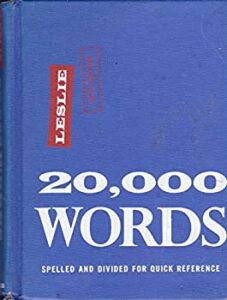 As I prepare to celebrate National Spelling Day next Monday, I can’t help but look back to when there was no such thing as “spellcheck.” If you were unsure how to spell a word, you looked it up in the dictionary. Better yet, you owned a copy of a nifty little book entitled “20,000 Words.” First published in 1934, the author called it a “dictionary without definitions,” designed for folks who simply want to know how to spell or divide troublesome words, not research their meanings or pronunciation. I use my copy—a 1965 edition for which I paid $2.75—so often that I don’t bother to re-shelve it when I’m finished.
As I prepare to celebrate National Spelling Day next Monday, I can’t help but look back to when there was no such thing as “spellcheck.” If you were unsure how to spell a word, you looked it up in the dictionary. Better yet, you owned a copy of a nifty little book entitled “20,000 Words.” First published in 1934, the author called it a “dictionary without definitions,” designed for folks who simply want to know how to spell or divide troublesome words, not research their meanings or pronunciation. I use my copy—a 1965 edition for which I paid $2.75—so often that I don’t bother to re-shelve it when I’m finished.
I went off to college 50 years ago thinking I was a pretty good speller. Of course I knew the difference between “to,” “two” and “too,” “there,” “their” and “they’re” and “your” and “you’re.” I never wrote “then” when I meant “than.” I knew the difference between “accept and “except” and “alter” and “altar” and even “stationery” and “stationary.”
Kicking around the idea of majoring in Political Science, I took a class entitled “Introduction to American Government” the first quarter of my freshman year. My professor required an end-of-the-course term paper on anything that had to do with the U.S. Constitution. I chose the incorporation clause of the Fourteenth Amendment, which makes the Bill of Rights applicable to the states as well as to the federal government.
When the paper was returned to me, it was covered in red ink. I had spelled one particular word wrong every time I wrote it, which was often, and the professor had circled it every single time. The word? Amendment, which I had spelled ammendment. “Your research was excellent and your writing clear,” he wrote on the last page of the paper. “But I can’t in good conscience give you a grade higher than B since it’s obvious you don’t know how to spell amendment.”
I haven’t made that mistake again, though I still struggle with words that have—or don’t have—double consonants. Some are really, really hard. Accommodate. Embarrass. Millennium. Referred. Inoculate. Sheriff. Occurrence. Mayonnaise. I have to look these words up every time I write them.
I’ve memorized numerous other words because their spelling doesn’t make sense to me. Why do we take the “e” out of “judgment”? Why is there no “u” in “forty”? “Lightning” and “cemetery” are hard words, as is “tongue.” And don’t get me started on “Worcestershire,” which doesn’t appear in my copy of “20,000 Words,” or “daguerreotype,” which I don’t believe I’ve ever had occasion to write, or “hors d’oeuvres,” which I don’t even bother looking up any more. If I need to use it, I just substitute “appetizer.”
Silent letters cause some spellers fits, with good reason. It’s tricky to read or spell phonetically (and there’s an example of craziness—“ph” making an “f” sound) when words begin with a silent letter. Gnome. Herb. Knife. Pneumonia. Tsunami. Wrestle. And many words contain silent letters in the middle or the end. Answer. Castle. Doubt. Ghost. Hour. Indict. Mortgage. Sword. And that’s just the tip of the iceberg. It’s a wonder any of us ever learn to read or write.
But read and write we must, and most of us succeed (another hard word to spell) pretty well. Or at least I used to believe that was true. Social media often proves otherwise. There are times when I truly can’t comprehend a posted comment or question. And don’t even get me started on text messages. Take “wear r u going 2 eat at?” for example.
I did end up majoring in Political Science in college and I’m pretty sure I’ve never spelled “amendment” incorrectly since. Would that I could say the same about “Worcestershire.”
(April 2, 2022)